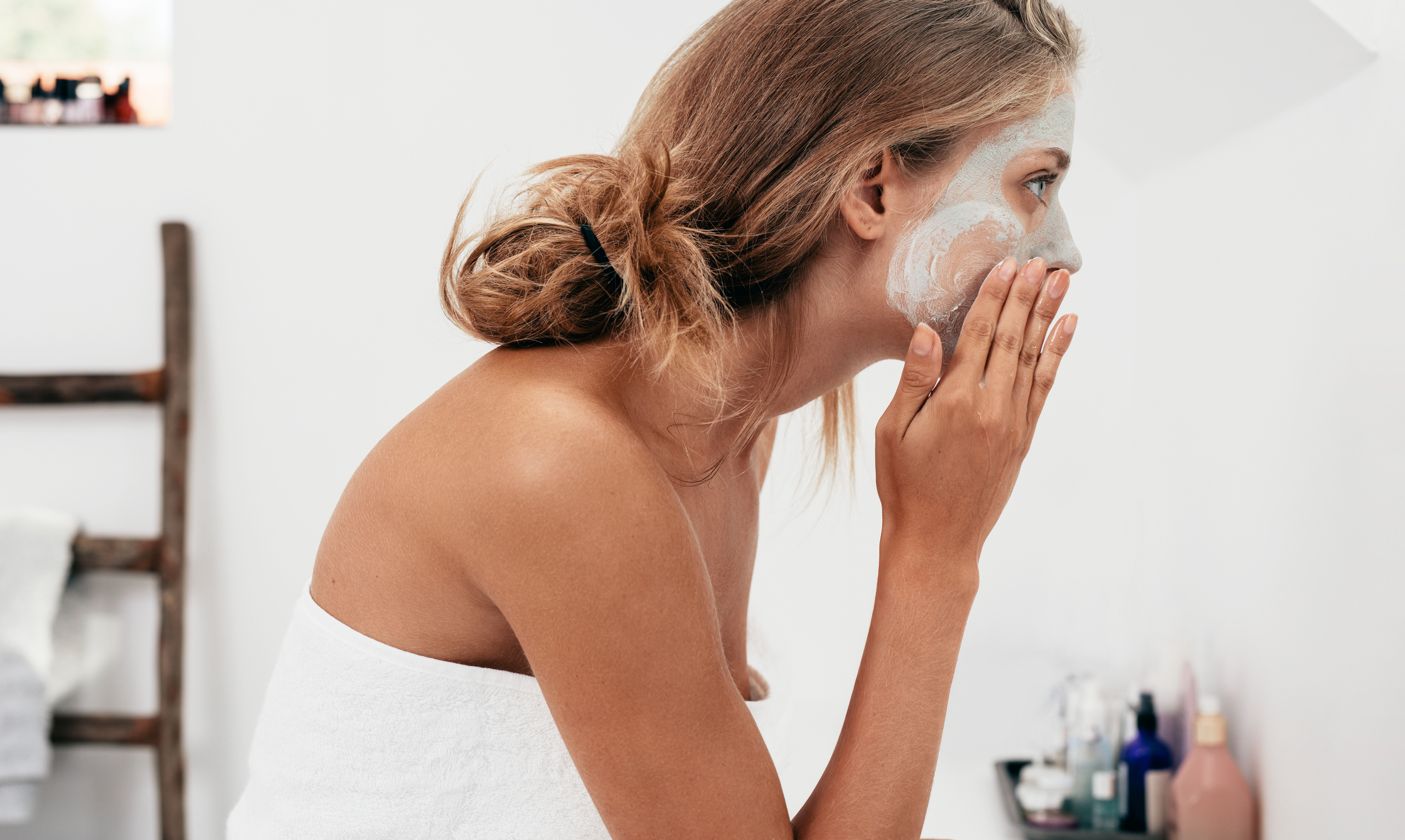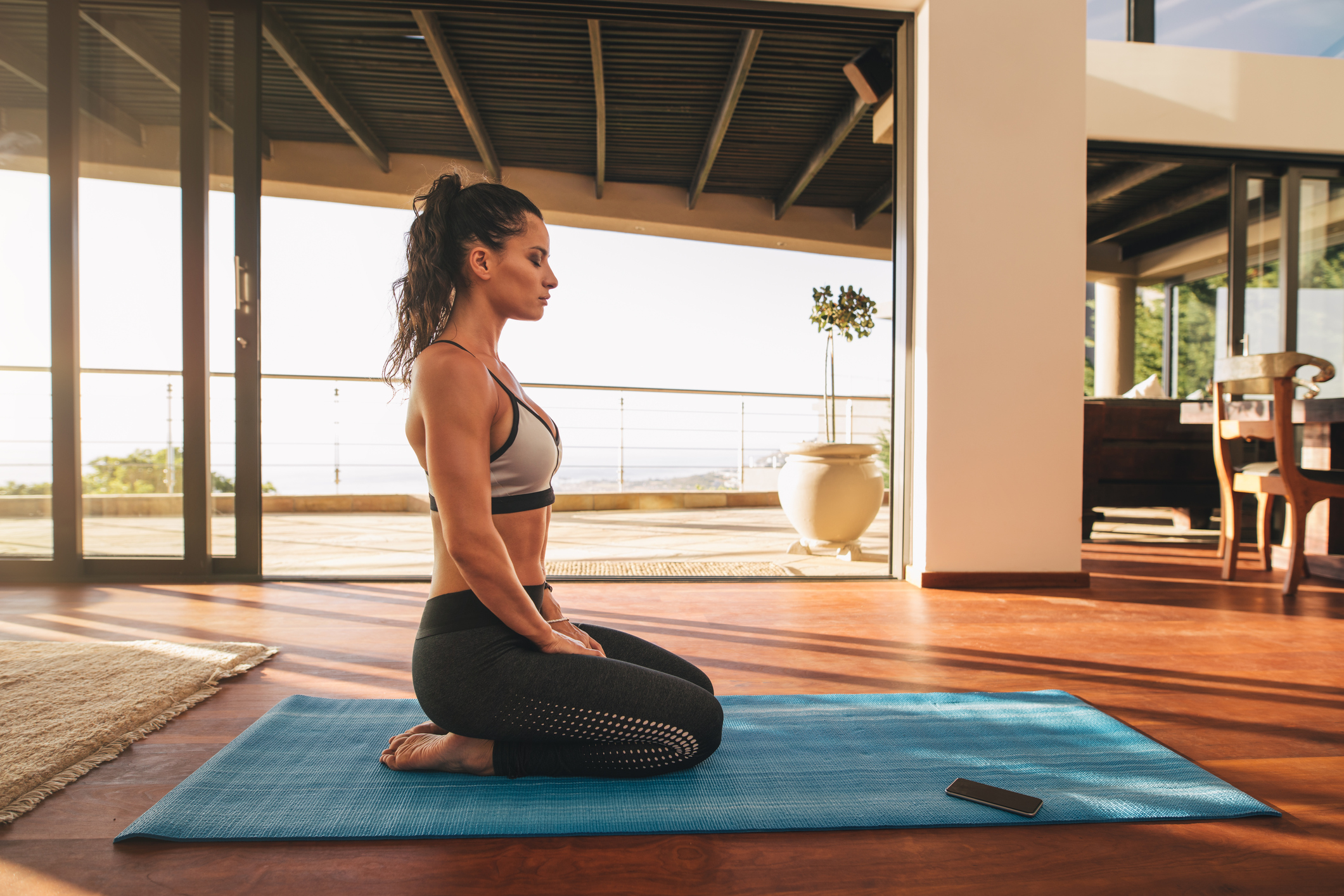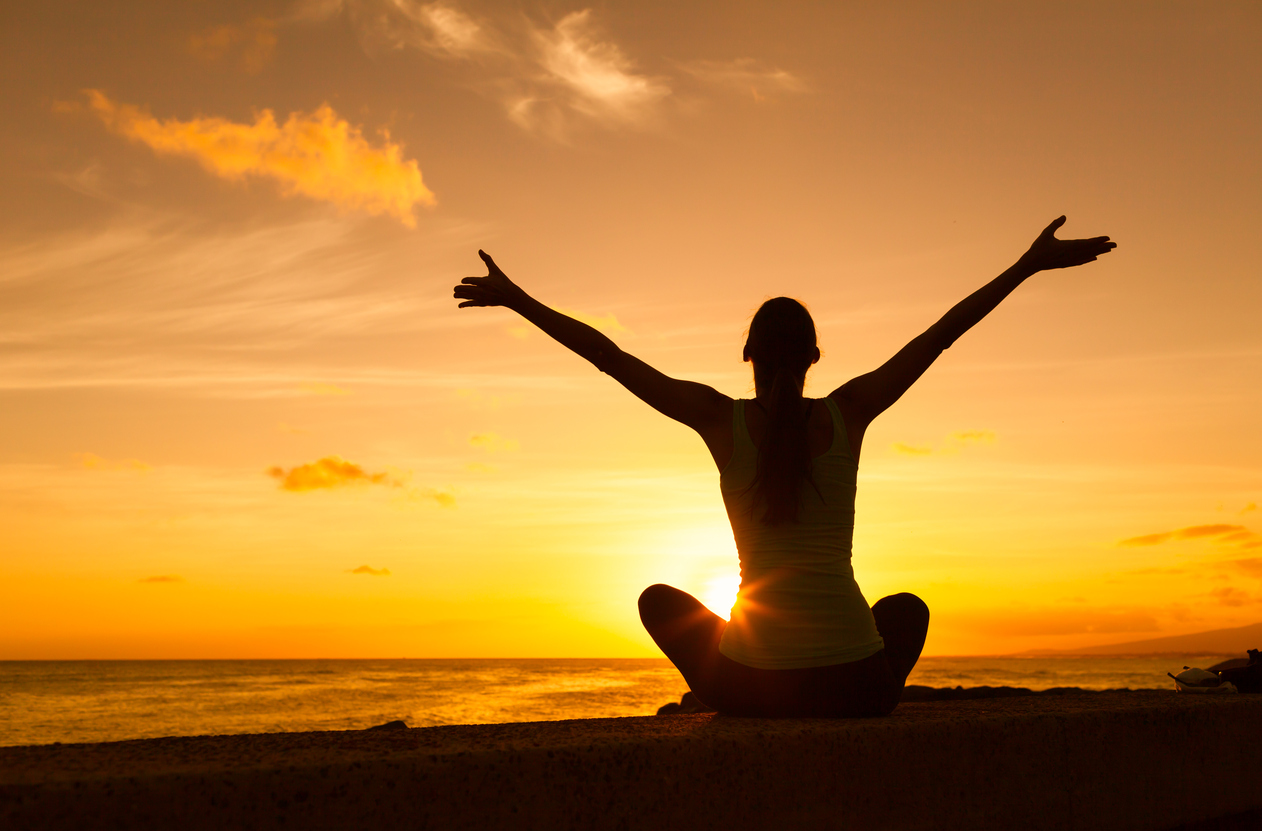Have you ever really considered what “health” even means? Or at least what it means to you?
It’s so easy to assume that health is measured by your jeans size, body fat percentage, or even simply the dietary philosophy you identify with.
Most of the “health experts” we see on social media make it look like our appearance is the primary indicator of how healthy we are. If we don’t have a stereotypically “fit” body, then we’re not truly healthy.
This couldn’t be further from the truth.
And if you never stop to question what your personal beliefs and values about health are, you’ll be blindly led by this belief that if you don’t “look” healthy then you’re not healthy.
The first thing I do with my private clients is to identify their top 3 health goals for our time together. Not only does this help guide the work that we do, but it also allows each person I work with to get really clear about what is most important to them about their health.
That way, they know they’re not following someone else’s idea about what real health is, but rather their own.
It’s been a while since I personally evaluated my own parameters of health, and what “real health” means to me at this stage of my life.
I used to be so driven by the desire to be physically fit and attractive. Perhaps even to have the coveted six-pack abs. But at least to have the type of body that I thought would make me worthy of love and affection.
(Thank God that I no longer live this way. Seriously.)
I’ve spent years of breaking down my beliefs about what makes a woman worthy (hint: you are already worthy!) and refusing to conform to society’s beliefs about what a woman should look like.
Now I’m finally at a place where I make diet, exercise, and lifestyle choices that support what I consider to be “real health.”
But sometimes I deviate from these choices and experience the consequences of not caring for my body appropriately.
Whether that’s an unhappy digestive system, fatigue that I can’t shake, or aches and pains in my body that aren’t usually there, I now know what signs to look for that my choices have deviated too far in an “unhealthy” direction.
And as a self-care practice (rather than self-punishment) I immediately revert back to what I know makes my body feel it’s best.
Not only physically, but mentally and emotionally as well.
In this post, I want to give you an idea of what I consider to be “real health” for me.
Here are my top 10 indicators of true health and wellbeing that guide my day-to-day diet, exercise, and lifestyle choices.

1. The Energy To Live My Purpose Daily
Energy is a difficult symptom to measure, but it’s one of the most important indicators of how my diet and lifestyle is affecting my health. My generally stable, consistent energy is what allows me to live out my purpose in my business and my personal life on a daily basis. It’s incredibly important to me.
Even one day of poor decision making immediately affects my energy (the joy of being in your 30s). So I do my best to create habits that maximize my energy without turning me into a complete hermit.
The most important choices that affect my energy include: sleeping 8 hours a night on a regular sleep schedule; eating adequate calories and carbohydrates, especially on a training day; exercising regularly but not excessively; avoiding alcohol; drinking tea instead of coffee; taking walking breaks throughout the day; and setting strong boundaries around my work hours.
A drop in energy is one of the most immediate indicators that I’ve gone off track. So I’ve learned to pay close attention to it and have developed daily and weekly habits that keep it optimized. This is why I’m so adamant about eating balanced, calorie appropriate meals throughout the day.
Of course there are times when I don’t make the most energy-supportive choices. But I also recognize that sometimes it’s okay to sacrifice my future energy for social opportunities.
Sometimes my husband and I stay out late watching a movie on date night. Or I get up at 6:30AM on a Sunday to volunteer at my church.
With the majority of my choices supporting good energy, I have some flexibility to do things that are less energy-supporting on a weekly basis.

2. The Ability to Take On (Unexpected) Physical Challenges
I have been training with a personal trainer since May of 2015, and on average lift heavy twice a week. That’s it.
I am considering looking for ways to get more active this year. But I’ve found that training twice a week is enough to keep my body strong and healthy enough to function well on a regular basis.
There are a few reasons I train heavy and consistently. One, I actually enjoy it. And honestly that could be the only reason I need to train. But I also have seen incredible fitness progress in the past 2-3 years. So I know this style of training is effective.
Finally, I love knowing that I can take on unexpected physical challenges without fear that I can’t do them.
Whether that’s a strenuous hike through the mountains of Colorado, surfing all day in Nicaragua, taking an Acroyoga workshop in downtown Raleigh, climbing a 70-foot tree in Costa Rica, or racing up the sand dunes on Lake Michigan (all things I’ve done in the past 3 years!)
I love having a level of fitness that allows me to challenge myself physically in new and unique ways.
I want to be able to jump into these types of activities with no prior experience whenever the opportunity presents itself. And I want to be able to do this for as long as possible.
The type of training I do consistently in my normal life gives me the freedom to try new things when I’m traveling or when someone invites me to try something new.
Next on my “to try” list? Indoor rock climbing! My husband bought me climbing shoes for Christmas. So we’re planning to try out some of the local climbing facilities soon!
3. A Digestive System That I Rarely Think About
This might sound like a weird way to describe my digestive function goals. But if you’ve ever had digestive symptoms that disrupt your daily life, you know what I’m talking about.
I’ve never been diagnosed formally with any gut issues. But I’m fairly confident I have a mild level of IBS that rears its ugly head if I go too far off course with my diet.
I have a decent amount of flexibility in what I eat. But I still need to set boundaries around my food choices in order to protect my gut function.
For example, I don’t eat wheat at home, but I’ll have some bread at a nice restaurant or cake at a wedding. I generally limit my dairy choices to fermented dairy, heavy cream, small quantities of cheese, and occasional ice cream. Occasionally I drink dark beer but try to limit the volume. I limit my portion sizes of nuts and seeds.
These are just a handful of the decisions I make around food that are essentially autopilot at this point because I know I can keep my digestive system happy eating this way.
If my gut starts to hurt or I have any weird change in my bowel function (constipation or loose stools), I know it’s time to clean up my diet choices if they’ve gotten too loose. Not in a self-judgmental type of way, but in a “my gut feels crappy and I want to fix it” kind of way!

4. Healthy Skin That Allows Me To Go Makeup Free
I said earlier in this post that my appearance isn’t how I track my health. But I do consider my skin health to be something that indicates if I’m doing well with a healthy routine.
I’ve had a few bouts of months-long breakouts that I can tie back to malnutrition and/or stress. I tend to be prone to certain nutrient deficiencies that show up in my skin health. Breakouts are an early-warning system of malnutrition for me.
Listen, I’m not trying to be a supermodel or anything. I don’t expect to never have a pimple or look flawless right out of bed.
But having skin that I am comfortable leaving the house with makeup-free is important to me. If things start to go pear-shaped, I make a serious effort to get things back under control.
Fortunately, my Beautycounter routine seems to be working pretty well for me at this point. My skin has been consistently clear for essentially the past year.
I love not having to worry about my skin.
Keeping it healthy is a priority that directs my diet and lifestyle choices, as well as how I spend my money on skincare.
5. A Regular, (Mostly) Pain-Free Menstrual Cycle
While I’ve never had amenorrhea, I have had issues with menstrual irregularity and hardcore PMS in the past. For me, I’m pretty sure the trigger for menstrual disruptions is stress, but I also believe my dietary choices affect how functional or dysfunctional my cycle is on a regular basis.
A few years ago, I was working with a naturopath on adrenal and sex hormone issues, likely caused by the stress of grad school and starting a new business.
Back then, the first day of my period was always miserable. I had serious cramping pain in my abdomen and terrible fatigue that left me wanting to lay on the couch all day. Plus, my cycles were way too long, sometimes ranging 40-50 days.
These days, my periods are pretty uneventful, which is just the way I like them. I track my cycle using my Daysy monitor so I know when it’s coming, and for the most part it’s consistently 32 days.
Occasionally it’ll be a bit longer if I was sick or super stressed in the months prior, but otherwise it’s a predictable and mostly pain-free experience.
And I hope to keep it that way by keeping my stress low, eating nutrient dense foods, and sleeping on a regular schedule.

Would you like to save this post?
Your email address is 100% safe and will never be sent spam.
6. A Calm and Stable Emotional and Mental State
Being a highly sensitive person (HSP) and an “outgoing introvert”, I’m prone to both anxiety and mild depression. While neither symptom has ever warranted medication, both can cause significant disruptions to my daily life if they get out of control.
There are times when my body feels incredibly anxious to the point where I am struggling to breathe. Yet in my mind I can’t think of an actual reason why I would feel stressed at all.
Or I feel triggered by something my husband said even though logically I shouldn’t be hurt by his words.
This might sound surprising to you since I tend to be a generally positive person. But I definitely go through rough patches of difficult emotions.
Because of this, I am very protective of my mental and emotional health in all that I do. I limit how many clients I work with on a weekly basis since sometimes the sessions can be very emotionally charged. Typically I avoid watching TV shows and movies that contain scenes of violence or horror. These shows can leave me feeling anxious for days (just don’t ask me why I watch Game Of Thrones…)
I’ve learned to value alone time throughout the week to recharge. These days I never force myself to attend social events with large groups if I don’t feel up to going.
I avoid conflict online and unfollow people on social media if their postings are regularly stressing me out. I listen to uplifting music (especially worship music) and read positive, empowering books.
I’m happy to say that most days I feel calm and emotionally stable. I feel in control of my emotions. That doesn’t mean I don’t ever get angry or feel sad – quite the contrary (just ask my husband!) It simply means feel that any emotional response I have is appropriate for the situation.
But staying in this state takes effort and vigilance. It requires making choices that I know support my emotional state.
(It helps that I’ve married a man who appreciates my emotional range. He never makes me feel ashamed of my emotions. This has made an amazing difference in how quickly I get out of funks!)
Being protective of my emotional health is why I’m hesitant to ever do a restrictive diet for any reason.
My most recent experience with a restrictive diet left me feeling extremely emotionally overreactive. This showed me that a balanced, calorie-appropriate diet plays an incredibly important role in my emotional health.
So my diet choices generally reflect my desire to feel emotionally stable on a daily basis, and eating enough is essential for that.
7. Very Little Physical Pain In My Body
In January of 2015 I was in a relatively minor car accident that caused some significant physical dysfunction in my body. I was rear ended, which caused whiplash and a mild concussion. Afterwards I was struggling with headaches and significant pain in my neck and upper back.
I was unable to exercise for several months. When I finally started taking longer walks with my dog, I found I had a deep hip pain. This pain unbeknownst to me was a symptom of inadequate physical activity throughout the day.
My pain and discomfort eventually prompted me to sign up to work with a personal trainer to get my body back into normal working condition.
Having gone through that difficult experience, I now view any physical pain in my body as a sign that my daily habits aren’t aligned with my health goals and values.
So what causes me physical pain? Not getting enough daily movement is probably the biggest trigger at this point. I combat this by making sure I take walks on a daily basis and do mobility work a few times a week.
Overtraining is another trigger. I’m extra careful around doing too much at the gym. I prioritize open communication with my trainer so that I never blindly follow his programming despite significant pain or discomfort.
Other things that contribute to physical pain are dehydration, excessive alcohol or caffeine, sleeping in an uncomfortable bed, too much screen time, and too much sugar or junk food in general.
If I ever start to feel pain or stiffness in my body, I re-evaluate my choices from the week and see where I can make improvements.

8. The Flexibility to Eat Out and Try New Foods Without Fear
This is another mental health factor that is incredibly important to me. While I try not to eat out more than 2-3 times a week at most, I do love eating out.
I love experiencing new foods or eating things I would never cook at home. I love trying local cuisine when I travel, especially when in foreign countries. And I also like to have the flexibility to get takeout if I don’t feel like cooking.
I’ve work with many clients who have a serious fear around eating out. Even to the point where some of them haven’t eaten a meal out of the house in months or even years.
I’ve never had that level of fear around food. But I have been in a mindset where I chose foods I didn’t really want to eat for the sake of getting something low calorie. Like getting sashimi instead of rice-containing sushi. Or just having a salad as my entree. (Honestly I don’t really like salads as my entire meal.)
I always want to have the flexibility to eat out when I want to, without fear or anxiety about the healthfulness of the food. I don’t want to worry if something has been cooked in vegetable oil or contains gluten.
While I still try to choose foods that won’t mess up my gut (since having a stomachache isn’t worth it to me), I don’t panic if I feel a little icky later. I just use it as a learning experience and make a different choice in the future.
9. A Strong, Authentic Social Support Network
I truly believe that having positive, supportive relationships is more important than eating a healthy diet or exercising regularly. Loneliness is a serious health risk. Having a strong social support network is a greater predictor of longevity than your diet and exercise habits.
So if you’re spending so much time in the gym or planning your meals that you have no time to nurture healthy relationships, you are probably doing more harm than good to your overall health.
I will happily sacrifice my “perfect” diet and exercise routine to make room for social experiences. I’d rather skip the gym to spend time with a friend. Or eat whatever I want on date night with my husband.
I eat “grocery store tacos” with my church small group once a week. My church relationships are more important to me than avoiding GMO corn and conventional beef.
I don’t let my “healthy habits” detract from my enjoyment of socialization.
Sometimes I start to notice that my friendships are feeling a little distant. That’s when I make it a point to reconnect with friends in person, even if it means I forego a workout or don’t get as much work done that day.
I also make it a habit to practice vulnerability in these relationships, which is a purposeful choice I make and not something that happens automatically.
It would be far easier to cruise through life without sharing the deeper parts of me with those who are important to me, but it would be incredibly lonely as well.
The strength of my relationships are just as important to my health as the food I put in my mouth, the number of hours I sleep, and my consistency in the gym.

10. Joy and Gratitude In All Circumstances
“Rejoice always, pray continually, give thanks in all circumstances; for this is God’s will for you in Christ Jesus.” – 1 Thessalonians 5 16-18 (NIV)
Cultivating joy and practicing gratitude is the final “real health” practice on my list, but it’s definitely not the least!
I’ve discovered that most of my “bad health habits” stem back to feeling unhappy or unfulfilled spiritually. When I forget to practice gratitude or pursue true joy in my life, I can easily turn to food, alcohol, or mindless media for entertainment.
This typically happens because I’ve become blind to the blessings in my life, or I’ve focused too much on the negativity that is so pervasive in the media. Or maybe the responsibilities of being a functional adult in modern society have simply worn me down.
When I talk about “true joy”, I’m talking about the deeper spiritual joy that comes from my relationship with God, and the gratitude I have for the beauty this life has to offer. When I look back and see where the Lord has brought me, I can’t help but feel joyful.
Being fully present to the beauty that exists in the world is what completes my experience of true health.
And honestly, it’s the only thing on this list that my physical health won’t ever change.
My body will age, my skin will sag, I won’t be able to do physically challenging things anymore, my social support network may fade, and eventually I’ll die.
It might sound morbid but if you think about what matters in the long term, it will shift your perspective of what “real health” looks like.
The capacity for joy and gratitude is universal and has little or nothing to do with physical health.
People confined to wheelchairs, people who have had their intestines surgically removed, people with burn scars across their face, people who are on liquid tube-fed diets, people with chronic pain, people who are unable to see or hear… they all have the capacity for happiness and mental wellbeing.
Our health, while important and worth valuing and prioritizing, should never be our primary source of joy.
My beliefs about what “true health” is may change, or may be totally different than yours.
But I hope you too will develop your own definition of health.
A definition aligned with your values that leaves you feeling healthy and balanced in all areas of your life.
Now I’d love to hear from you… how do YOU define “real health”? Share your thoughts in the comments below!
This post may contain affiliate links. If you click on a link and make a purchase, I may receive a small commission.

+ show Comments
- Hide Comments
add a comment